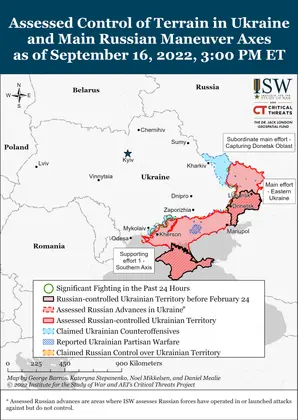Key Takeaways
- The discovery of mass graves and torture chambers in liberated Izyum confirm previous ISW assessments that the Bucha atrocities were emblematic of Russian activities in occupied areas rather than an anomaly.
- Russian President Vladimir Putin apparently threatened to expand Russia’s attacks on civilian Ukrainian infrastructure if Ukraine continues reported attacks on military facilities in Russia.
- The Ukrainian Resistance Center warned that Russian forces may conduct false flag attacks in occupied areas between September 17 and September 20.
- Ukrainian forces captured all of Kupyansk City on September 16, continuing offensive operations east of the Oskil River.
- Ukrainian forces reportedly shelled targets in Valuyki, Belgorod Oblast, Russia, overnight on September 15-16.
- Ukrainian forces struck Russia’s occupation headquarters in Kherson, likely using HIMARS, and are continuing ground maneuvers in three areas of Kherson Oblast as part of the ongoing southern counteroffensive.
- Russian administrative officials are rallying around Chechen leader Ramzan Kadyrov’s call for “self-mobilization” at a local level to provide additional forces to the Russian military.
- Forced Russian mobilization campaigns are likely depleting male populations in parts of the claimed territory of the Russian proxy Donetsk and Luhansk People’s Republics (DNR and LNR) along the front lines.
- Immediate and coordinated Russian information responses suggest that Ukrainian partisans may not be responsible for the September 16 assassination of the Luhansk People’s Republic (LNR) Prosecutor General and his deputy.
The revelations of mass graves of civilians and torture chambers in newly liberated Izyum confirm ISW’s previous assessments that the Bucha atrocities were not isolated war crimes but rather a microcosm of Russian atrocities throughout Russian-occupied areas. The Ukrainian General Staff published images on September 16 showing a mass burial site in Izyum, Kharkiv Oblast and noting that Ukrainian President Volodymyr Zelensky said that the site contained more than 400 bodies showing signs of torture and brutality. The Ukrainian Ministry of Reintegration reported that the number of war crimes victims in Izyum may exceed those of Bucha. The head of Ukraine’s National Police, Ihor Klymenko, stated that Ukrainian officials have found 10 Russian torture chambers in Vovchansk, Kupyansk, Balaklia, and Izyum.[3] One torture chamber was reportedly located in the Balakliya police department, where “Russians wore masks and tortured civilians with bare electric wires,” according to Andriy Nebytov, the head of the National Police Main Directorate in the Kyiv region.
JOIN US ON TELEGRAM
Follow our coverage of the war on the @Kyivpost_official.
ISW Non-Resident Fellow Nataliya Bugayova had warned in April 2022 that “Bucha is an observable microcosm of a deliberate Russian terror campaign against Ukrainians. Similar intentional atrocities are happening throughout Russian-occupied areas in Ukraine.” Ukrainian officials will likely continue to find evidence of Russian war crimes and atrocities as Ukrainian forces liberate occupied areas.

Moscow Claims AFU’s Best Troops ‘Ground Down’, Kyiv’s 2025 War Plans ‘Derailed’
Russian President Vladimir Putin appeared to threaten increased attacks on Ukrainian civilian infrastructure if reported Ukrainian attacks on Russian military positions in Russian Federation territory continue. Putin said that Russia has been “rather restrained in our response” to Ukrainian “terrorist acts [and] attempts to damage our civilian [sic] infrastructure” in a question-and-answer session with reporters following the Shanghai Cooperation Organization meeting on September 16. He continued “more recently, the Russian armed forces have dealt a couple of sensitive blows” that are “warning shots,” and threatened that more serious attacks could follow. Putin did not explicitly refer to the reported Ukrainian strikes on the base of the Russian 3rd Motorized Rifle Division near Valuyki that occurred on September 16, nor did he make clear which Russian actions he was referring to. But Russian forces have increased attacks on civilian infrastructure throughout Ukraine over the past several weeks as Russian media personalities increase explicit calls for such attacks.
Putin’s comments are likely in part a response to criticism by Russian milbloggers, who attacked the Kremlin for failing to protect Russian territory and for failing to respond adequately. One milblogger asked if the Kremlin still regards Belgorod Oblast as part of Russia, part of the “special military operation” zone, or part of Ukraine. Another blamed the reported Ukrainian attack on Valuyki on the so-called “regrouping” of Russian forces (referring to the initial language the Russian Ministry of Defense used to describe the rout of Russian forces in Kharkiv Oblast) and warned that another “regrouping” could allow Ukrainian forces to attack other critical Russian areas. Putin has increasingly shown a determination to appease the milbloggers and the constituencies they speak to and on behalf of, even at the expense of the uniformed Russian military and the Russian Ministry of Defense.
The Ukrainian Resistance Center warned on September 16 that Russian forces are planning to conduct false flag attacks against civilian population in Russian-occupied Ukraine and urged Ukrainians in occupied areas to avoid public places between September 17 and September 20. The Resistance Center suggested that such false flag attacks could be attempts to “divert the attention of the world community from the defeat in Kharkiv and the discovery of Russian war crimes” in liberated areas.
Authors: Katherine Lawlor, Grace Mappes, Mason Clark, and Frederick W. Kagan.
See the full report here.
You can also highlight the text and press Ctrl + Enter






